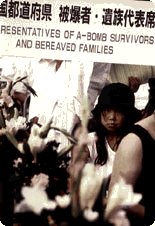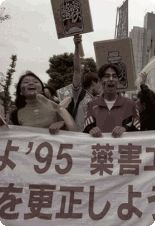 Don't mention the war
Don't mention the war
Whoever closes his eyes to the past is blind to the present.
Whoever refuses to remember the inhumanity is prone to the risks of new infection
(West) German President Richard von Weizsacker in a historic speech to the Bundestag 1985

Being there
To write a poem
With seventeen syllables
is very diffic ...
Namazu, The Killer Catfish

There will be no earthquake in Kyobe. Precautions would require an enormous amount of money, & would leave a burden for the Younger generation.
Kobe Mayor Kazutoshi successfully urging the city's disaster prevention committee in 1985 not to institute any major precautions against an Earthquake

Suffer the children
Older brother, sorry for the inconvenience
Suicide note of Kiyoteru Okochi, aged thirteen, who was bullied to death.
 Toxic Doc
Toxic Doc
Iatrogenic: ... any adverse condition in a patient occurring as the result of treatment by a physician or surgeon...
- Dorland's Medical Dictionary
¤ ¤ ¤ ¤ ¤ ¤ ¤ ¤
Japan behind the lines
Ben Hills (1996)
Photographs by Mayu Kanamori
ISBN 0 7336 0088 3
The past three years have been perhaps the most momentous in the history of postwar Japan. As a foreign correspondent during that time, Ben Hills was uniquely placed to observe and interpret those turbulent times from an Australian perspective.
The Japanese are facing major changes to their ancient civilisation: long-held attitudes and beliefs are being challenged as the country comes to terms with its place in the modern world. Japan is undergoing social upheaval as it struggles to adjust to these radical changes in its identity -- in the workplace, in schools and universities, in politics and the bureaucracy, and in the way minorities are treated, how criminals are dealt with and even how the Japanese enjoy their leisure.
This book focuses on the way these events have affected the lives of both ordinary and extraordinary citizens -- from the farmer to the suburban policeman, the Shinto priest to the yakuza gangster. It delves beneath the tatamae, or surface pretence, that has long been Japan's public face to find out what the Japanese really feel about their country and the important challenges they face in this critical area.
Japan -- Behind the Lines is not a heavy economic treatise, nor is it a glib account of the Japanese stereotypes that are many people's picture of this complex culture. Instead it is an entertaining and thoughtful insight into postwar Japan, its politics and its people.
|